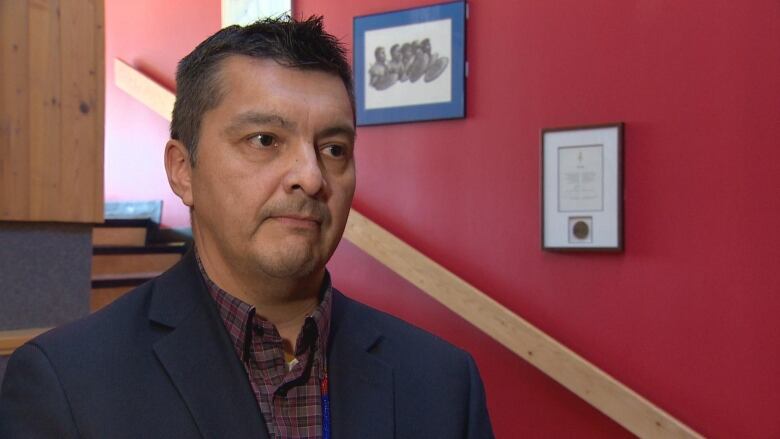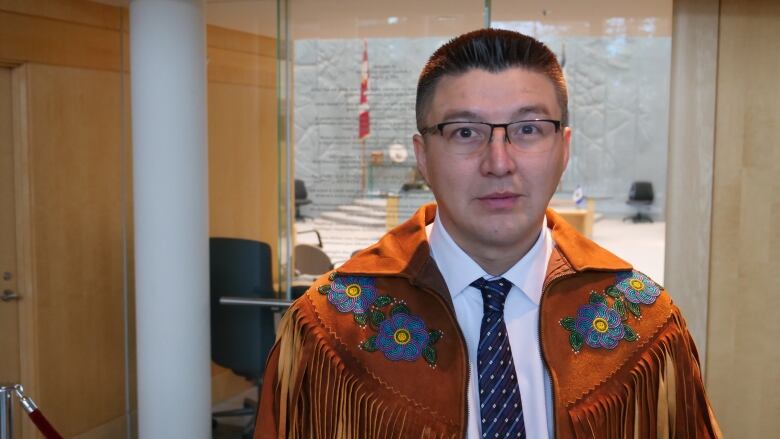N.W.T. MLA booted from House after refusing to apologize for comments about premier
'Truth and integrity however, are [more] important than hurt feelings,' says Monfwi MLA Jackson Lafferty

The MLA for Monfwi is not apologizing for suggesting the Northwest Territories premier overstepped her authorityand"breached the collective privileges" of the Legislative Assemblywhen she fired the former president of Aurora College.
For refusing to recant on Wednesday, Jackson Lafferty was kicked out of the legislature for the day.
"It was never my intention to scandalize this house. I'm sorry if the word caused my fellow MLA discomfort," Lafferty said, speaking in Tlicho and English, before his dismissal.
"Truth and integrity, however, are [more] important than hurt feelings, therefore Mr. Speaker, for speaking the truth, I will not apologize to this House."
It's nothing personal.- Jackson Lafferty, Monfwi MLA
For refusing to "fully apologize and withdraw his remarks," House Speaker Frederick Blake Jr. directed Lafferty who was himself speaker in the last Legislative Assembly to exit the chamber.
In an interview while the assembly was still in session, Lafferty said he's standing firm because his constituents want him to keep the government accountable and transparent.
'There's still a question'
"There's still a question out there about the whole process of the termination of the Aurora College [president]," he said. "The ruling came down, so I had to leave the House. At the same time, it's still an outstanding issue, not just for me, but people from the public are still asking."
Lafferty's question has to do with whether the premier broke the law when she fired Tom Weegar, the previous president of Aurora College and assistant deputy minister responsible for education renewal.
Laffertyargues that the premier was allowed to dismiss Weegar from his role as assistant deputy minister, but not from his post at the top of Aurora College.
The people want the government to release the information upon which it based its decision to oust the head of Aurora College, "similar to what I've done," he said, referring to a legal opinion on the matter he tabled in the Legislative Assembly.
Cochrane says she didn't break the law and that she's also gotten a legal opinion. She says while an associate deputy minister may be made president of Aurora College, "the employment relationship of deputy ministers and associate deputy ministers is clearly with me as Premier," so she has the authority to let such a person go.
WATCH: The full interview with Lafferty after he got kicked out Wednesday
A former cabinet minister, Lafferty sought the premiership after October's territorial election, but lost to Cochrane.
On Wednesday, he dismissed the notion that his conflict with Cochrane is personal.
"People are saying, 'Well, Jackson is doing this because he's not too happy with the decision that came down [about the] premier. That's definitely not the case. It's nothing personal," he said.
"The public deserves answers and I'll continue to push in whatever avenue about the whole process, and that's my job as MLA."
Lafferty crossed the line, says speaker
Blake had asked Lafferty to apologize and withdraw remarks he made about Premier Caroline Cochrane during a point of privilege on Feb. 27.
In that statement, he accused the premier of acting in contempt of the Legislative Assembly when she fired Weegar. He said Cochrane overrode the authority of the assembly and consequently "obstructed the ability of the legislature in carrying out lawmaking functions."

In a decision on a point of order delivered on Tuesday, Blake said Lafferty's remarks "did cross the line."
Blake ruled the Monfwi MLA broke House rules that prohibit a member from suggesting another member uttered a "deliberate falsehood," or has "false or hidden motives."
Blake also found that Lafferty used "abusive or insulting language of a nature likely to create disorder."
But when asked to apologize on Tuesday, Lafferty refused.
He said he would not discuss the matter because there was no Tlicho interpreter present, and he wanted to speak in his language. The Tlicho interpreter was sick that day.
Lafferty often begins his statements in the house in Tlicho, before switching to English.
"It's very important that I speak my language, one of the 11 official languages in the House," he said. "It is my right to do so."
It's very important that I speak my language, one of the 11 official languages in the House.- Jackson Lafferty, Monfwi MLA
Lafferty asked Blake to "shut down the House" because he could not speak his language.
The Monfwi MLA's stance prompted an outpouring of support from regular members on Wednesday, who one-by-one rose to speak about the importance of language rights.
"I stand up today in support of the member from Tlicho," said Frieda Martselos, MLA for Thebacha and former chief of Salt River First Nation. "I only wish that I had the privilege of knowing my official language."
Steve Norn, MLA for Tu Nedh-Wiilideh, urged the house to imagine what it would be like if proceedings were in a language other than English and there was no English interpreter.
"If we couldn't translate into that, the record would show nothing in English, we'd see nothing, and to me that's not right."
Though N.W.T. Official Languages Act provides the right to use an official language in proceedings of the Legislative Assembly, said Blake, Legislative Assembly rules are silent on the right to use and be understood in official languages.
The matter was referred to a standing committee of MLAs, who must return a recommendation for how to proceed in similar circumstances within 120 days.












_(720p).jpg)


 OFFICIAL HD MUSIC VIDEO.jpg)
.jpg)



























































































